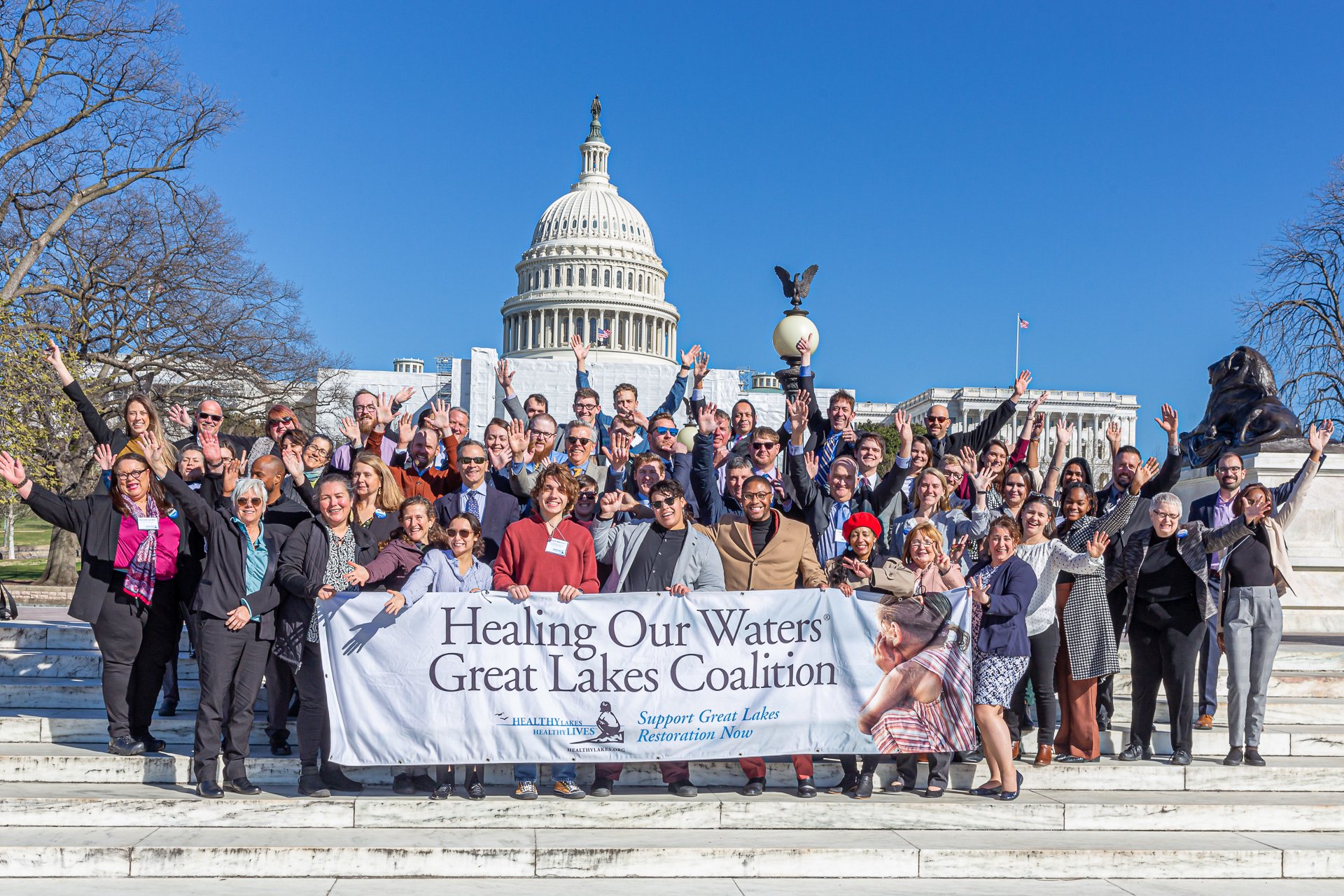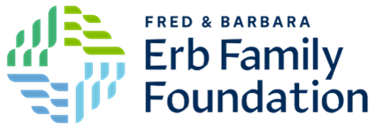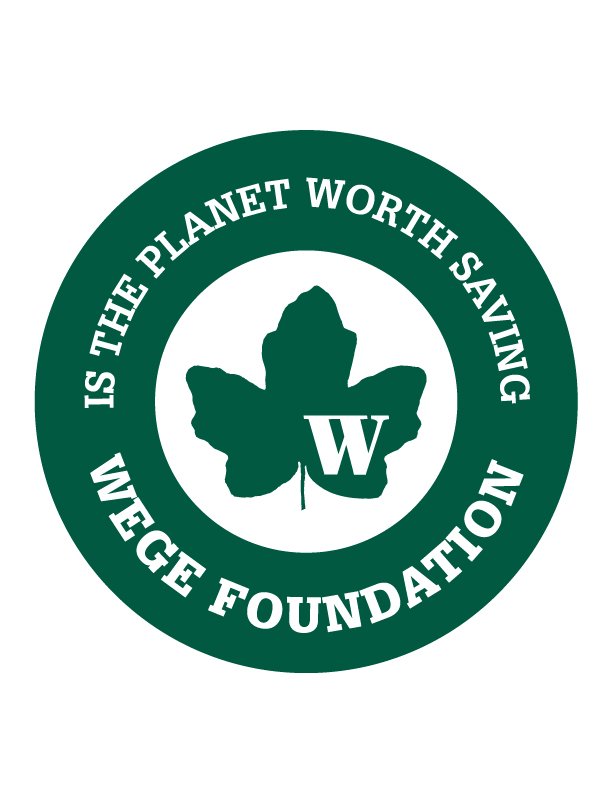
Who We Are
For more than 20 years, the Healing Our Waters–Great Lakes Coalition has been working to protect and restore the Great Lakes, which provide drinking water to more than 30 million people in the eight-state region of Illinois, Indiana, Michigan, Minnesota, New York, Ohio, Pennsylvania, and Wisconsin. The Coalition consists of more than 200 environmental, conservation, outdoor recreation, and community-based organizations. By harnessing the collective talent, knowledge and passion of our members, the Coalition has made Great Lakes restoration a top bipartisan priority in the U.S. Congress and with presidential administrations.
Our Work
The Healing Our Waters-Great Lakes Coalition’s mission is to secure a sustainable Great Lakes restoration plan and the federal funding to implement it. To date, federal investments have produced results, but serious threats remain, and our job is not done until we’ve put an end to drinking water restrictions, fish consumption advisories, and beach closures. Further, data from the EPA says that some communities—especially low-income, Black, Latino, and Indigenous communities—are more likely to be dealing with serious health threats from pollution. We are working to ensure that the communities that have been harmed the most by pollution are prioritized when it comes to cleanup, and that the people who live in those communities have a voice in the solutions.
To achieve our goals, the Coalition convenes our members, partners, and allies to discuss regional clean water priorities, provides tools, resources, and trainings on these issues, and brings together Great Lakes advocates at several events throughout the year, including Great Lakes Day in Washington, D.C., to educate and inform public officials, and an annual Great Lakes Conference.
Values
Collective Impact: We are a Coalition with shared vision that is committed to working strategically, efficiently, collaboratively, and compassionately for Great Lakes and its residents.
Equity and Justice: Water is a basic human need, and we work to ensure everyone has access to clean, safe, and affordable water. We believe that actions to protect and restore clean water and healthy ecosystems must reverse environmental injustices and prevent future ones.
Informed Solutions: We put forward multi-faceted solutions based on the scientific, cultural, social and traditional ecological knowledge of our members, partners and allies to address the most urgent threats to the Great Lakes ecosystem and all who rely on them.
Inclusion: While we recognize the strength of a shared vision and collective agenda, we also value the importance of having diversity among our membership with respect to cultural, gender identities, race, politics, life experiences, and knowledge.
Democracy and Public Engagement: Clean water for all depends on a strong and healthy democracy, and we believe that environmental policies, practices, and enforcement are stronger, more effective, and more equitable when the American public participates in decision-making. Further, we believe that governments at all levels are responsible for maintaining, protecting, and restoring the nation’s water resources for the benefit of all people.
Priorities
The Healing Our Waters–Great Lakes Coalition has identified five priorities to ensure that our Great Lakes communities, ecosystems, and water remain healthy.
Supporting Great Lakes Restoration Investments
Since 2009, the U.S. Congress has invested more than $3.5 billion (at least $300 million per year) in the Great Lakes Restoration Initiative to clean up toxic pollution, restore fish and wildlife habitat, fight invasive species, and reduce farm runoff. The initiative has received strong bipartisan support and the Coalition has worked to secure additional funding up to $475 million, as well as an implementation plan that prioritizes ecosystem health alongside community health and the need to confront the climate crisis. The Coalition also advocated for an additional $1 billion within the Bipartisan Infrastructure Law for the cleanup of the most polluted sites in the region—Areas of Concern.
Ensuring Safe and Affordable Drinking Water for All
Lead contamination that poisons drinking water. Sewage contamination that closes beaches. Ruptured pipes that cause sink holes in roads. Skyrocketing water bills that plague residents. These are consequences of our nation’s insufficient water infrastructure. The Coalition is leading efforts to address these crises and the $188 billion backlog in drinking water, wastewater, and stormwater infrastructure, so all people have access to safe and affordable water services. The decades-long federal disinvestment in water infrastructure has put the onus on local communities, which are often unable to afford costly infrastructure improvements. The result has been a one-two punch of insufficient water infrastructure and skyrocketing water bills, with the burden of payment placed on community members.
The Infrastructure Investment and Jobs Act provided much-needed funding to address outdated infrastructure. However, more work remains to provide everyone with safe and affordable drinking water and sanitation services. Additional federal investments are needed in the form of grants, not loans, with a focus on ensuring that these historic investments reach those communities with the greatest need.
Fighting Clean Water Rollbacks that Threaten the Health of Our Drinking Water
The last presidential administration stripped away protections for streams and wetlands across the country— waters that people depend on for drinking water. With many of our cities and towns living with unsafe drinking water, now is not the time to cut back on clean water enforcement. We need more—not less—protection for clean water. The Coalition is restoring clean water protections that were rolled-back and working to safeguard all of the waters that communities depend on for their drinking water, public health, jobs, and quality of life.
Stopping the Spread of Invasive Species
Invasive species such as invasive carp threaten the ecology of our lakes and the economy of the region—particularly the $7 billion commercial, recreational and tribal fishing industry. The Coalition is harnessing its resources to ensure that these destructive species do not make their way into the Great Lakes and is working to stop new non-native invaders through other avenues, such as the ballast discharge of international ships.
Reducing Toxic Algal Blooms Across the Great Lakes Region
Toxic algal blooms poison drinking water, threaten fish and wildlife, kill pets, and harm the outdoor recreation economy. The Coalition is committed to pursuing strategies to combat and eliminate these toxic blooms from the Great Lakes, primarily by curtailing farm fertilizer and animal waste from polluting our water and causing toxic algae blooms that threaten drinking water.
Staff and Leadership
Staff from the National Parks Conservation Association and the National Wildlife Federation run the coalition from offices in Washington, D.C., and Ann Arbor, Mich.
The Governance Board provides strategic guidance to the Coalition. Additionally, the board approves the Coalition’s annual budget and campaign plan.
The Equity, Advisory and Action Committee provides support to the Governance Board on implementing diversity, equity, inclusion, and justice (DEIJ) in Great Lakes work, and advocates for the concerns of communities harmed by pollution. Members of the committee guide outreach to community organizations for submitting content to the annual Great Lakes Conference, and partner with state leads to uplift and elevate the voices of frontline communities with Members of Congress.
Members
The Healing Our Waters-Great Lakes Coalition consists of more than 200 environmental, conservation, and outdoor recreation organizations; zoos; aquariums; and museums. Our member organizations represent millions of people who share a common goal: restoring and protecting North America’s greatest freshwater resources—the Great Lakes.
View the Coalition’s membership by state in the dropdowns below.
How to Join
Joining is easy! An authorized member of your organization should contact our field director, Celia Haven at HavenC@nwf.org to request an application to join. Our board approves new member applications quarterly.
Becoming a member provides your group access to the resources and partnerships built by the Coalition. Our listserv, website, and strong membership network in each state allows your group to plug into the advocacy efforts of the Coalition on issues pertinent to the Great Lakes. Those issues include protecting drinking water, restoring habitat, fighting invasive species, cleaning up toxic pollution, and reducing runoff.
There is no membership fee associated with joining the Coalition.
-
Abiinooji-Aki
Alliance for the Great Lakes
American Rivers
American Sportfishing Association
Beyond Nuclear
BlueGreen Alliance
The Conservation Fund
Citizens’ Environmental Coalition
Council of the Great Lakes Region
County Executives of America
Delta Institute
Ducks Unlimited
Elevate
Environment America
Environmental Law and Policy Center
Faith in Place
Flow Water Advocates
Freshwater Future
Great Lakes Business Network
Great Lakes Islands Alliance
Great Lakes Observing System
Great Lakes Spirituality Project
GreenLatinos
Izaak Walton League of America
Lake Erie Charter Boat Association
Lake Superior Watershed Conservancy
Land Trust Alliance
League of Women Voters Lake Michigan Region
Lighthawk
National Audubon Society
National Parks Conservation Association
National Wildlife Federation
Natural Resources Defense Council
The Nature Conservancy
Plastic Oceans
Restore America’s Estuaries
River Network
Surfrider Foundation
The Stewardship Network
Trout Unlimited
Union of Concerned Scientists
Water Protection Network
The Wetlands Initiative
-
Bluestem Communications
Brookfield Zoo
Environment Illinois
Great Lakes Boating Federation
Illinois Council for Trout Unlimited
Illinois Division of the Izaak Walton League
Illinois Environmental Council
Illinois Sierra Club
John G. Shedd Aquarium
League of Women Voters of Illinois
Little Village Environmental Justice Organization
Metropolitan Planning Council
Midwest Pesticide Action Center
Prairie Rivers Network
-
Friends of the St. Joe River Association, Inc.
Griffith Izaak Walton League of America
Hoosier Environmental Council
Indiana Conservation Voters
Indiana Division of the Izaak Walton League of America
Indiana Dunes Tourism
Indiana Wildlife Federation
Just Transition Northwest Indiana
League of Women Voters of Indiana
Northwest Indiana Paddling Association
Northwest Indiana Steelheaders
Save the Dunes
Sierra Club Hoosier Chapter
-
BaySail-Appledore Schooners
Clean Water Action – Michigan
Cleanup Club
Clinton River Watershed Council
Conservation Resource Alliance
Cranbrook Institute of Science
Detroit Zoological Society
Dwight Lydell Chapter of the Izaak Walton League
Ecology Center
Environment Michigan
Flint River Watershed Coalition
Friends of the Detroit River
Friends of the St. Clair
Friends of the Rouge
Genesee County Hispanic Latino Collaborative – La Placita
Groundwork Center for Resilient Communities
Huron Pines
Huron River Watershed Council
International Association for Great Lakes Research
John Ball Zoological Gardens/John Ball Zoo Society
Kalamazoo River Cleanup Coalition
Kalamazoo River Protection Association
Kalamazoo River Sturgeon for Tomorrow
League of Women Voters of Michigan
Legacy Land Conservancy
Michigan Audubon Society
Michigan Climate Action Network
Michigan Council of Trout Unlimited
Michigan Environmental Council
Michigan Forest Association
Michigan Green Muslims
Michigan League of Conservation Voters Education Fund
Michigan Microplastics Coalition
Michigan United Conservation Clubs
Michigan Wildlife Conservancy
Middle Grand River Organization of Watersheds
Mona Lake Watershed Council
Muskegon River Watershed Assembly
Northern Initiatives
Saugatuck Dunes Coastal Alliance
Sierra Club Michigan
Southwest Detroit Environmental Vision
Tip of the Mitt Watershed Council
Wastewater Education 501(c) 3
Watershed Center Grand Traverse Bay
We the People of Detroit
West Michigan Environmental Action Council
Zero Waste Detroit
-
Bush Lake Chapter
Clean Water Action – Minnesota
League of Women Voters of Minnesota
Minnesota Center for Environmental Advocacy
Minnesota Conservation Federation
Minnesota Council of Trout Unlimited
Minnesota Environmental Partnership
St. Louis River Alliance
-
Audubon New York
Buffalo Audubon Society
Buffalo Niagara Waterkeeper
Citizens Campaign for the Environment
Citizen Science Community Resources
Coalition on West Valley Nuclear Wastes
Environmental Advocates of New York
Genesee River Watch
Genesee Valley Audubon Society
League of Women Voters of New York
New York State Division of the Izaak Walton League
New York State Zoo
NYPIRG
Onondaga Audubon
Residents for Responsible Government
Save the River
Seneca Park Zoo
Talking Rivers
Western New York Environmental Alliance
-
Chagrin River Watershed Partners
Environment Ohio
Environmental Health Watch
Friends of Euclid Creek
Headwaters Chapter Izaak Walton League of America
The Junction Coalition
Lake Erie Advocates
Lake Erie Foundation
League of Ohio Sportsmen
League of Women Voters of Ohio
National Museum of the Great Lakes
Ohio Conservation Federation
The Ohio Division of the Izaak Walton League of America
Ohio Environmental Council
Ohio Environmental Council Action Fund
Ohio Sierra Club
Ohio Wetlands Association
Partners for Clean Streams
Tinkers Creek Watershed Partners
West Creek Conservancy
Western Reserve Land Conservancy
Winous Point Marsh Conservancy
-
Environment Erie
Lake Erie Region Conservancy
Nature Abounds
Penn Environment
PennFuture
-
Clean Wisconsin
Dairy Grazing Apprenticeship
Discovery World
Gathering Waters: Wisconsin’s Alliance for Land Trusts
Green Lake Association
Lakeshore Natural Resource Partnership
League of Women Voters of Wisconsin
Midwest Environmental Advocates
Milwaukee Riverkeeper
Milwaukee Water Commons
River Alliance of Wisconsin
River Revitalization Foundation
Sierra Club – John Muir Chapter
S.O.H2O
Southeastern Wisconsin Watersheds Trust, Inc.
Superior Rivers Watershed Association
Wisconsin Environment
Wisconsin Green Muslims
Wisconsin Lakes
Wisconsin League of Conservation Voters
Wisconsin Trout Unlimited
Wisconsin Wetlands Association
Wisconsin Wildlife Federation
-
Friends of the Coves
Georgian Bay Association
Georgian Bay Eco Museum
Georgian Bay Forever
Nature Quebec
ReForest London
Sierra Club Ontario
Toronto Green Community








